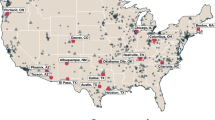Abstract
Employing data (n = 734) collected from those having attended the Pacific Sociological Association (PSA) annual meetings held in San Diego, California (2012) and Reno, Nevada (2013), we test whether session quality and host-city satisfaction are positively associated with how respondents rated the overall quality of the meetings. A majority (54 %) of respondents reported the quality of the meetings highly (“Above Average” or “Excellent”), and suggestive of the importance of conference location, this declined from 64 % in 2012 to 41 % in 2013. Controlling for individual characteristics and institutional affiliation, regression results intimate that both host-city satisfaction and session quality are positively associated with how respondents rated the overall quality of the meetings. And they suggest that the former is somewhat more important than the latter for explaining variation in meeting quality. A final stage of our analysis (n = 205) finds that attendees’ evaluations of changes in how the 2013 PSA meetings were developed and organized are positively associated with meeting quality without diminishing the independent effects of session or location quality. We discuss implications of these results for future PSA meetings, as well as for research investigating how to improve the quality of regional academic conferences more generally.




Similar content being viewed by others
References
American Sociological Association Task Force on Assessing the Undergraduate Major. (2005). Creating an effective assessment plan for the sociology major. Washington, D.C.
American Sociological Association Task Force on Sociology and General Education. (2007). Sociology and general education. Washington, D.C.
American Sociological Association Task Force on the Master’s Degree in Sociology. (2009). Thinking about the master’s degree in sociology: Academic, applied, professional, and everything in between. Washington, D.C.
American Sociological Association Task Force on the Undergraduate Major. (2004). Liberal learning and the sociology major updated: Meeting the challenge of teaching sociology in the twenty-first century. Washington, D.C.
American Sociological Association, Research and Development Department. (2006). What can I DO with a bachelor’s degree in sociology?: A national survey of seniors majoring in sociology. Washington, D.C.
Cross, P. K., & Steadman, M. H. (1996). Classroom research: Implementing the scholarship of teaching. San Francisco: Jossey-Bass.
Downey, D., & Orr, A. (2014). Between scylla and charybdis: designing, implementing, and assessing innovations in the annual PSA meetings. The American Sociologist. doi:10.1007/s12108-014-9224-y.
Godfrey, E. P. (Ed.). (1998). Teaching sociology at small institutions. Washington, D.C.: American Sociological Association.
Hohm, C. F. (2011). 2011 PSA annual meeting satisfaction survey. The Pacific Sociologist, 19(3). http://pacificsoc.typepad.com/newsletters/psa%20newsletter_0911.pdf.
Hohm, C. F. (2012). 2012 PSA annual meeting satisfaction survey. The Pacific Sociologist, 20(3). http://pacificsoc.typepad.com/newsletters/psa_newsletter_0912.pdf.
Hohm, C. F. (2013). 2013 PSA annual meeting satisfaction survey. The Pacific Sociologist, 21(3). http://pacificsoc.typepad.com/newsletters/psa%20newsletter_0913.pdf.
Hohm, C. F., & Johnson, W. S. (2001). Assessing student learning in sociology (2nd ed.). Washington, D.C.: American Sociological Association.
Hosmer, D. W., & Lemeshow, S. (1989). Applied logistic regression. New York: Wiley.
Silver, I., & Shulman, D. (Eds.). (2008). Academic street smarts: Informal professionalization of graduate students. Washington, D.C.: American Sociological Association.
Spalter-Roth, R. M., & Erskine, W. B. (2003). How does your department compare?: A peer analysis from the AY 2001–2002 survey of baccalaureate and graduate programs in sociology. Washington, D.C.: American Sociological Association.
Studenmund, A. H. (2001). Using econometrics: A practical guide (4th ed.). Boston: Addison Wesley Longman, Inc.
van Dijk, J., & Maier, G. (2006). ERSA conference participation: does location matter? Papers in Regional Science, 85(4), 483–504.
Van Valey, T. L. (Ed.). (2011). Peer review of teaching: Lessons from and for departments of sociology. Washington, D.C.: American Sociological Association.
Author information
Authors and Affiliations
Corresponding author
Rights and permissions
About this article
Cite this article
Marcelli, E.A., Hohm, C.F., Kil, J. et al. The Quality of Recent Pacific Sociological Association (PSA) Meetings: Location, Session Quality and Institutional Change. Am Soc 45, 140–155 (2014). https://doi.org/10.1007/s12108-014-9222-0
Published:
Issue Date:
DOI: https://doi.org/10.1007/s12108-014-9222-0




